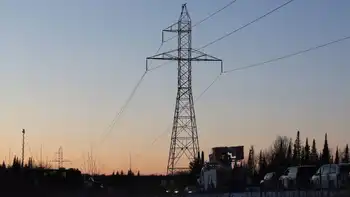Price of power: While JPEC customers enjoy lower rates, Paducah Power's TVA ties prove costly
KENTUCKY - Kentucky has the cheapest electricity rates in the entire country, but they often go unnoticed to Paducah Power System customers who open their utility bill and see the high end of the state average. And until PPS is free of its Tennessee Valley Authority contract at the end of 2009, rates are estimated to go up 2 to 2.5 percent a year.
Right now, Kentucky distributors pay an average of 4.9 cents per kilowatt hour, but PPS customers pay 6.99 cents after about an 8-cent add-on to the 6.2 cents PPS pays to TVA. PPS General Manager David Clark said that's due in large part to TVA's increasing rates, which are the highest of any electricity wholesaler in the state.
Meanwhile, Jackson Purchase Energy Corp., which services parts of the city and much of the county, is able to keep its rates at least two-thirds the price of PPS rates, despite its provider, Big Rivers Electric, filing for bankruptcy 10 years ago. Mike Core, president and CEO of Big Rivers, said long- time customers of the company's distributors may remember when rates were much higher compared to today's. "What happened was, we were among the very highest," Core said of pre-bankruptcy times. "We built a power plant in the '80s, and it turned out that we didn't need it. "A lot of people forget how much our rates were for a long time." By 1998, the debt was restructured, but it's still not gone.
However, unlike TVA, JPEC isn't allowed to raise its rate to make up for the financial deficit. JPEC rates are regulated by the Kentucky Public Service Commission and subject to approval by the federal Rural Utilities Service. If Big Rivers needs more capacity and is authorized to build additional plants, the KPSC will sign off on an increase. Otherwise, rate increases to their distributors are not permitted, so there is no increase for distributors to pass onto customers. "We're able to keep the rates stable, and it turns out lower," Core said. "Because we don't need more capacity just yet, we were able to keep our rates more stable.... However, we still have a tremendous amount of negative equity. It's a bit of an albatross around our neck."
Meanwhile, Clark said, even though TVA is about $30 billion in debt right now, it's still making payments on time, so it stays out of bankruptcy. "They're chartered by Congress, so they don't need authorization" to raise rates, he explained. "If they didn't have that, we would be competitive with JPEC today, or be under their rates." TVA rates have gone up by about 10 percent since October. After the contract with TVA ends, Paducah Power will receive its power from Prairie State Energy Campus - a $2 billion coal power plant planned for Washington County, Ill., about 35 miles north of Carbondale.
Clark said rates are estimated to be 12-17 percent lower than TVA rates in 2010, but he thinks it may be closer to 20 percent. PPS is one of 158 TVA power distributors across six states, and five other distributors have canceled their contracts. Clark said that's not a significant number to hurt TVA, and in fact, it may eventually lessen the company's financial burden because less power will need to be bought at wholesale rates on the open market to meet demand. So what caused TVA to become indebted in the first place? "They started to build 11 or 12 nuclear power plants (in the last 30 years), but they only completed four," Clark said.
Just one of those uncompleted plants resulted in a $400 million loss to the company, he said. And a TVA deal with Enron went bad when the company, Clark said, "reneged on a contract," forcing TVA to buy power on the open market for more money. PPS Finance and Administration Director Dave Carroll said that comparatively speaking, Kentuckians, even those serviced by TVA, are well off. "If we were in another state, it'd be fine," he said. "But when you're in the lowest-cost state, it's difficult to swallow. We look forward to the day when we can lower our rates." Maryland power distributors have it the worst, paying about 16.1 cents per kilowatt hour.
But they only get about 25 percent of their power from coal, compared to 91 percent in Kentucky. Only five other states receive more than 90 percent of their power from coal, and they pay between 5 and 6.1 cents per kilowatt hour. Carroll said residential bills are calculated based on a $8.5 flat fee, plus the energy consumption of 6.99 cents per kilowatt hour.
The average resident, he said, pays $78 a month. That's an average of 1,000 kilowatt hours a month, per home. Businesses, Carroll said, are more difficult to average because their usage fluctuates so much. Those commercial rates are figured with a "peak usage" charge that's determined based on the single point in the month when power usage peaked.
For example, if a business were to run its largest machines just one day a month, the peak would likely be recorded on that day. Recently, Paducah's Image Graphics owner David Long said a combination of high energy costs and declining business forced him to seek a new location in McCracken County for his 40-year Paducah business.
Electricity rates through JPEC would be 42 percent cheaper, he said. Mayor Bill Paxton said there haven't been any other businesses moving or opting not to come into the city because of higher power rates then they may find in the county. "I have not had any other business or company complain to me or threaten to move out of the city of the rates by Paducah Power," Paxton said.
"When you compare our rates by TVA with rates in other parts of the country, in a lot of cases, our rates look very favorable, obviously." Parts of the Industrial Park West off of Old Cairo Road are powered by PPS, and others are by JPEC, Paxton said. But the overall cheap Kentucky rate has an advantage, he said. "Sometimes, that works in our favor," Paxton explained. "Nobody that we've ever negotiated with that's in the TVA area has said we're not going to come unless you can get us cheaper power.”
Whether increasing rates will dissuade companies from coming over the next three years is yet to be seen, but "If Paducah Power is successful (in the Prairie State venture), then I think the next five to seven years will probably work to our favor, as far as being successful in bringing new jobs to our area," Paxton said.
"We'll be more competitive than we are today."
Related News

Electricity users in Newfoundland have started paying for Muskrat Falls
ST. JOHNS - With their July electricity bill, Newfoundland Power customers have begun paying for Muskrat Falls, though bills haven't significantly increased — yet.
In a July newsletter, Newfoundland Power said electricity bills were set to decrease by 6.4 per cent as part of the annual rate stabilization adjustment, which reflects the cost of electricity generation.
Instead, that decrease has been offset by a 6.1 increase in electricity rates so Newfoundland and Labrador Hydro can begin recovering the cost of Muskrat Falls, the $13-billion hydroelectric megaproject that is billions over budget and years behind schedule.
That means for residential customers, electricity rates will…




